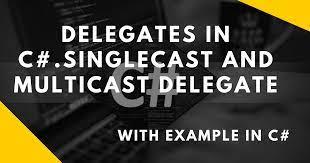Delegates are an important concept in the C# programming language. A delegate is a type of object that holds a reference to a method, allowing it to be passed around as a parameter or stored in a data structure. Delegates are similar to function pointers in other languages, but they provide greater type safety, as the compiler checks to ensure that the delegate's signature matches that of the method it points to.

Delegates are used extensively in the .NET Framework to allow developers to write their event-handling logic or pass a method as an argument to another method. They are also used to implement lambda expressions, which can be used to create anonymous functions.
There are three main types of delegates in C#: single-cast, multi-cast, and generic delegates.
Single-cast delegates are the simplest delegate type, allowing a single method to be bound to the delegate. The method's signature must match the delegate's signature, and the method must be either an instance or a static method. Single-cast delegates are typically used for simpler tasks, such as invoking a single method.
Multi-cast delegates are more powerful than single-cast delegates, as they allow multiple methods to be bound to the delegate. The signature of the methods must still match the signature of the delegate, and the methods can be either instance or static. Multi-cast delegates can invoke multiple methods in order, allowing for more complex logic to be built.
Generic delegates are a type of delegate that allows developers to specify the types of parameters and return the type of delegate. This allows a single delegate to work with multiple methods as long as the signatures of the methods match the delegate's signature. Generic delegates are typically used for more complex tasks, such as invoking methods that have different parameter types.
In addition to the three main types of delegates, C# also supports anonymous methods, which allow developers to write inline code that the delegate can invoke. Anonymous methods are useful for quickly adding logic to a delegate without writing a separate method.
To summarize, delegates are an important feature in C# that allows developers to pass methods as arguments to other methods or store them in data structures. Delegates come in three main types: single-cast, multi-cast, and generic delegates. Anonymous methods can also quickly add logic to a delegate without writing a separate method.